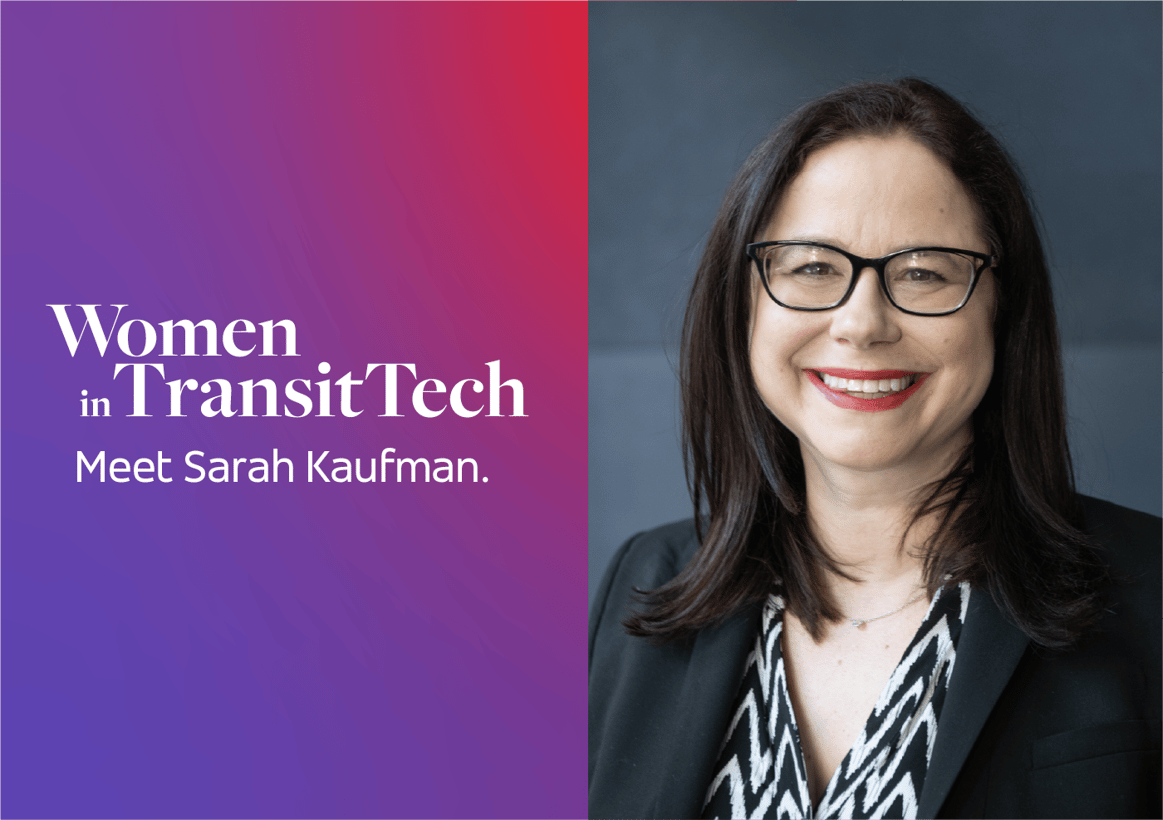Challenging the status quo takes diligence, determination, and vision — especially when it comes to an industry that hasn’t seen a seismic shift since the automobile was invented. And, as it turns out, it’s often women who choose to challenge these norms. In honor of International Women’s Day and throughout the month of March, Via is proud to profile a number of changemakers driving real innovation in their communities and inspiring their peers. Enjoy the story below, and then check out the rest of the series here.
Sarah Kaufman connects the dots between transportation and technology, and gives a megaphone to those who need it. After receiving her Masters degree in Urban Planning at the New York University (NYU) Wagner School of Public Service, she went on to work at the New York City Department of Information Technology and Telecommunications, then the Metropolitan Transportation Authority (MTA), before returning to NYU, as the Associate Director of the Rudin Center for Transportation.
Sarah’s work is focused on 21st-century mobility: Crisis impacts on urban flows, transportation technology for people with disabilities, boosting women leaders in the industry, political protest on city streets, and new patterns in micromobility. She’s also the instructor of Intelligent Cities: Technology, Policy, and Planning and Advanced Projects in Urban Planning at NYU.
What did 10-year-old Sarah want to be when she grew up? How did you evolve from there to your current position in transportation? I wanted to be Carmen Sandiego — that international woman of mystery always on the run from a V.I.L.E. Henchman. It's fair to say that there was not a direct line from Carmen to my current career. But playing hours of that game on the computer developed my interest and comfort around technology, which I later expanded to helping me understand urban systems.
What do you think are the most important qualities in a leader? Are there any leaders in particular you look up to? A good leader is ever-evolving. They must be willing to hold themselves accountable and be held accountable by others. They should always strive to recognize the humanity in their employees, and be willing to take risks.
I admire several leaders in the transportation sector, but one person I particularly admire is Meera Joshi, the former Chair of the NYC Taxi & Limousine Commission. She took on some significant challenges during the emergence of rideshare in NYC, hired some of the smartest people in government, learned about data minutiae on the job, and developed a thick skin against the neverending trolls that pursued her. Most importantly, she spoke regularly about leading with a moral compass, which was evident in her work and her energy.
What are the big transit challenges in your community that your team is solving with innovative mobility projects? At the Rudin Center, we try to solve issues of inequity with an eye toward the future. Transportation was not explicitly planned for women, people with disabilities, and lower-income workers; they experience reduced levels of safety, usability, and reliability of services. We try to address these problems by bringing light to these issues when planning for new transportation modes (like autonomous vehicles or shared electric scooters), through research, and with public events.
We also believe in the importance of representation. In our Emerging Leaders in Transportation Program, we train people who are underrepresented at the top. We specifically work on developing their innovative ideas and identifying solutions to problems they see. I love to see these leaders perpetually rise in their organizations. By diversifying transportation leadership, the issues faced by many groups are more likely to be recognized and solved. Investing in future leaders is the best innovation.
In your view, what’s the biggest challenge the transportation industry as a whole will have to tackle in the next 2-5 years? The transportation industry will grapple with autonomy. Although there is a rather large chasm between the technologies promised and the time until autonomous vehicles are woven into the daily life of cities, several issues need to be addressed. For example, what is the future of driving jobs? That's 200,000 people in New York City alone. How can we ensure fair and accurate intelligence on board these vehicles, so that they will not prioritize some users over others? And how will we stem the tide of car ownership?
This is work I'm launching now at NYU with my colleague Joe Chow, and I hope to make a dent in how New York City approaches the panoply of autonomous things-on-wheels coming our way.
Tell us about a defining moment in your professional life that has helped guide you on your path. At a previous job, I was sitting in my cubicle when a man came by looking for my colleague. Eventually, it emerged that he had assumed I was his secretary, not his colleague. Though I was merely sitting in a sea of cubicles, I had clearly been singled out as the only woman on that work floor. Later that day, my colleague Malinda came by and invited me to a dinner of the Women's Transportation Seminar, saying, "We have to stick together." The words never rang truer than in that moment. In the years since, I repeatedly learned the important lesson of relying on other women for support and lifting each other up at every opportunity.
And finally, what drives you? (Pun intended!) I'm naturally a fixer — and there's so much to fix! The intersection of technology and transportation is coming together unevenly, like a zipper that's been closed off-track. I'm here to repair the connection and make the two intertwine seamlessly, while ensuring fairness, equity, and sustainability at the same time.




